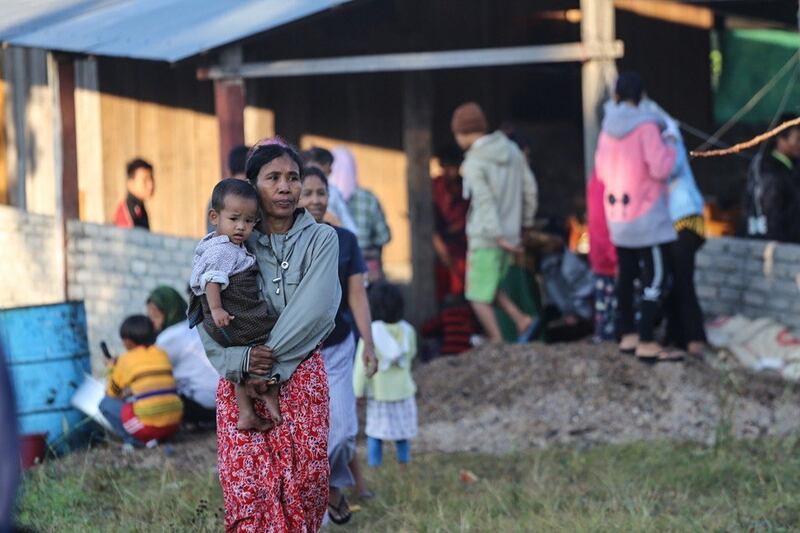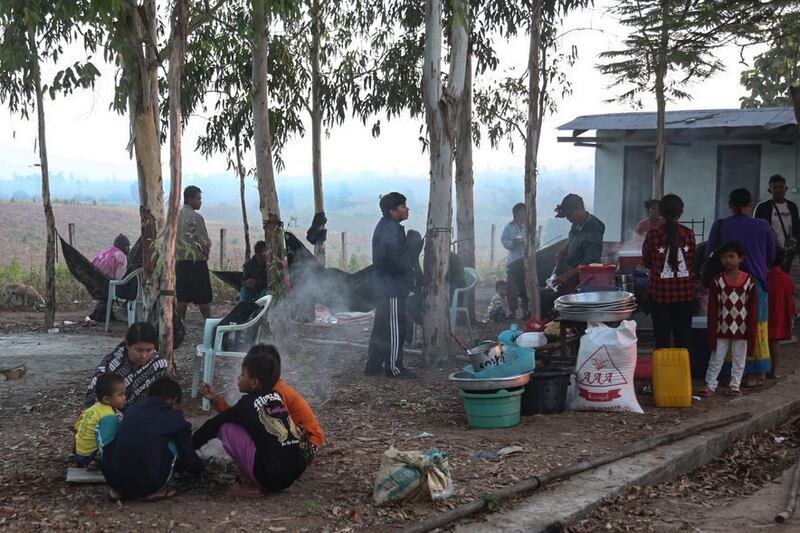Thousands of people in Myawaddy township in Myanmar’s Kayin state have been displaced by fighting between the military and anti-junta forces over the past two weeks, officials and relief groups said Wednesday, with more than one-third having crossed the border to Thailand.
The exodus began on Dec. 15, according to sources, when government troops engaged with members of the local prodemocracy People’s Defense Force and the armed branch of the ethnic Karen National Union — known as the Karen National Liberation Army — in Myawaddy’s Lay Kay Kaw area.
Since then, more than 16,000 residents of Lay Kay Kaw and the surrounding villages of Phlu Gyi, Phlulay, Rathegu, Hyeemae Warkhi, Mae Htaw Thale and Pahikalaw have fled for safety. Of those, an estimated 6,000 people have crossed the border into neighboring Thailand’s Tak province to escape the violence.
Naw Say Say, the general secretary of the Women’s League of Burma, which helps refugees along the Thailand-Myanmar border, told RFA’s Myanmar Service that many of the people who have crossed into Thailand are sheltering at a cattle ranch near Mae Sot township’s Mae Kot Kin village.
“As far as we know, there are tens of thousands of people [displaced] from more than 10 villages on the Myanmar side,” she said. “They are moving from place to place, and it’s hard to get the exact numbers.”
Naw Say Say added that there is a shortage of necessities like clothes, medicine, food and shelter for the refugees.
Rescue workers told RFA the refugees suffered from an outbreak of cholera beginning on Dec. 20 due to lack of clean water but that the situation has since improved.
Ye Min of the Thailand-based Aid Alliance Committee said his group is trying to locate a site for a more permanent camp on the Thai side of the border but is facing difficulties due to the large number of refugees who have crossed over from Myanmar.
“There isn’t enough space for everyone because we received more than 5,000 people without any prior notice,” he said.
“Some are now taking shelter in a barn, but the place had to be cleared up first. And then we put new tents in the open field, and it was hot. It’s very hot at night as they must sleep on plastic sheets. The situation is very difficult.”
He said the refugees are enduring extremely unsanitary conditions with just a few toilets for thousands of people. The aid committee is working to expand facilities, he said.

Aid stretched thin
A woman who is sheltering in Thailand told RFA that she fled after the military began shelling her refugee camp on the Myanmar side of the Thaungyin River.
“Our camp was the first to get attacked. The first shell hit the kitchen hall at the rear of the camp, and we all fled,” she said.
“We had to cross the river as the shelling continued. It was very hard crossing the river with small children and elderly people. Even while we were crossing the river, the Burmese army was firing at us in the river from the other side.”
Aid groups said the refugees do not have to worry about food for the time being but expect that supplies will be difficult to secure over the long term.
Most of those who fled did so “barefoot [and] without any possessions,” Wanlop Malai, a Thai volunteer based in Tak province, told BenarNews, an RFA-affiliated online news service.
“In the past, most of the donations were clothes. The government does not have the budget for it. We are short on food supplies,” he said on Tuesday. “There are about 5,000 refugees, and we need 15,000 boxes of food for three meals each day.”
The governor of Tak province told the international media that the number of refugees in Thailand who fled fighting in Myanmar had risen to 5,358 as of Dec. 26. He said Thai security officials are stepping up humanitarian assistance to the refugees and that medical care is being provided to the injured.
Asked if Thailand would allow the United Nations refugee agency to have full access to the refugees, Tanee Sangrat, a spokesman for the country’s Foreign Affairs Ministry, told Benarnews that his government had been working closely with the United Nations High Commissioner for Refugees (UNHCR) “to share assessments and planning should the need arise where the Thai authorities are unable to manage the situation themselves.”
“At present, various protection and other needs are being met by our interagency task force, and we will continue to monitor the volatile situation along our border, to address a number of concerns there, from COVID-19 to trafficking to humanitarian concerns such as this one. And we will continue to work together with UNHCR and our NGO partners to do so.”
Thai Prime Minister Prayut has said he will not build more refugee camps on the Thai side of the border. He told reporters on Wednesday that the refugees will have to return home when conditions improve.

Fighting ongoing
Fighting has continued in the Lay Kay Kaw area of Myawaddy township, with Karen National Union (KNU) officials accusing the junta of using civilian vehicles to expand its military presence along local routes in the region.
Additionally, the KNU said Tuesday that hundreds of civilians have also fled ongoing military activity in the Muthe area of neighboring Bago region’s Nyaunglebin township.
KNU foreign affairs officer Padoh Saw Tawney told RFA on Wednesday it was not yet possible for the refugees in Thailand to return home because the military has so deployed “many units” in KNU-controlled areas.
“There will be no peace if their troops continue to enter instead of withdrawing. So, what we want to call for is a withdrawal of the troops and an end to all acts of violence against civilians,” he said.
“The people are not running away for no reason. They were forced to flee their homes because shells and bullets were raining on their villages. [The military] cannot hide this fact from the world.”
Residents told RFA that fires were seen burning as recently as Tuesday evening in Lay Kay Kaw, where the military is stationed. The KNU said recently that the military began using airstrikes against Karen National Liberation Army forces on Dec. 23.
Reported by RFA’s Myanmar Service and by Nontarat Phaicharoen in Bangkok for BenarNews. Translated by Khin Maung Nyane. Written in English by Joshua Lipes.
